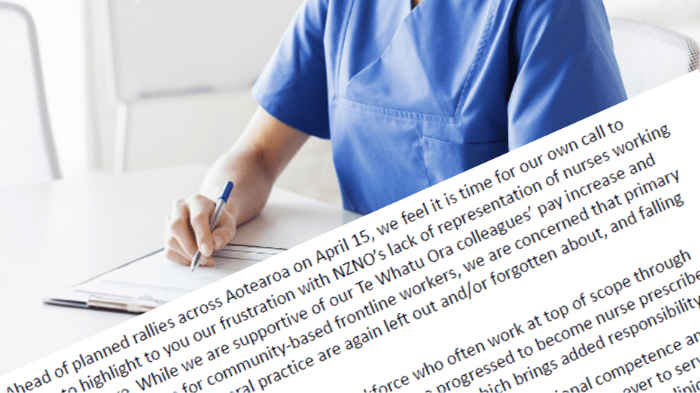
An open letter to the New Zealand Nurses Organisation
Pinnacle Midlands Health Network has sent an open letter to Paul Goulter and the New Zealand Nurses Organisation requesting stronger representation of primary care nurses working in general practice in Te Whatu Ora multi-employer collective agreement (MECA) bargaining negotiations. The letter was jointly signed by Pinnacle’s CEO Justin Butcher, and nursing director Jan Adams on behalf of our workforce.
This week we learned almost 5,000 New Zealand nurses have registered to work in Australia since August. We don’t know the complete workplace makeup of those 5,000, but we do know the earning potential in Australia is a key driver for thousands of New Zealand nurses who choose to head overseas. The reality is that this pay disparity isn’t just a trans-Tasman issue; it’s a crisis right here in Aotearoa New Zealand, and this pay disparity between primary care nurses and our counterparts in other nursing environments must become a priority for NZNO.
Ahead of planned rallies across Aotearoa on April 15, we feel it is time for our own call to action to highlight to you our frustration with NZNO’s lack of representation of nurses working in primary care. While we are supportive of our Te Whatu Ora colleagues’ pay increase and the pending increase for community-based frontline workers, we are concerned that primary care nurses working in general practice are again left out and/or forgotten about, and falling behind even further.
Primary care nurses are a highly skilled workforce who often work at top of scope through extended roles and post graduate study. Many have progressed to become nurse prescribers, adding an additional service to their local communities which brings added responsibility.
Primary care nurses are required to maintain high levels of professional competence and carry a high level of responsibility within their expanded roles, doing more than ever to service a growing population that has ever-increasing needs. They are running their own clinics, providing treatment for whānau, and showing their immense value within the primary healthcare team. Although this demonstrates great depth of knowledge and expertise, it is not reflected or acknowledged in the current Primary Healthcare multi-employer collective agreement (MECA).
Throughout the COVID-19 pandemic, primary care nurses were the first to respond, completing most of the swabbing in general practice, and managing this huge increase in workload all the time trying to keep other services afloat. We were at the forefront of the Covid vaccination programme and annual flu campaign. The mental and physical stress of this and the last couple of years has taken its toll. What did we get in return for this? To date, nothing!
With Te Pae Tata Interim New Zealand Health Plan 2022 covering a period of reset, we all hope for a health service delivery system that better serves all New Zealand's people and communities. However, with the vital Te Pae Tata work and community focused initiatives, GP and nurse practitioner shortages are going to see even more registered nurses choosing to work in alternate settings, leaving whānau even further compromised with increasing wait times for routine and screening health events. A stable, resourced primary care nurse workforce is essential in a new, safe, effective health system.
Pay inequity is not a sustainable option for primary care practice nurses. We are seeing evidence of a workforce that is burned out, feeling hopeless, and leaving their positions in large numbers while at the same time recruitment and retention are at an all-time low for the primary care workforce. If you add to that the rising cost of living, it is no wonder many general practices are finding it next to impossible to hire new staff. Nurses need employment that offers them a fair and equitable wage, and this is not currently found in primary care.
We note your recent public comment that the government’s exclusion of GP practice nurses from the funding initiative to address pay disparities in the nursing and kaiāwhina workforces from 1 April is “regrettable”. We appreciate that you will “continue to press the case strongly for GP practice nurses to be covered.” However, we need your assurance that NZNO will prioritise primary care nurse pay inequity and advocate aggressively for this group of professionals.
We feel that NZNO has not, to date, done this strongly enough, with your main focus being on those employed in secondary care. Nurses in primary care are also members of your organisation. Now is the time for you, as CEO of NZNO, to lobby politicians and ensure they are fully informed of these current crises and unfair treatment of primary care nurses. It is disingenuous for politicians to say they are unaware of a pay inequity, unless our hardworking and vital nursing workforce are not being represented by our union.
We ask for transparency and regular updates on Te Whatu Ora MECA bargaining negotiations. We are happy to discuss our concerns with you in more detail and look forward to strong and successful advocacy by NZNO for the primary care nursing workforce.
Congratulations to the recipients of the 2019 Royal New Zealand College of General Practice (RNZCGP) College Awards presented Saturday 27 July at the RNZCGP annual Conference.
Read moreIntroducing Carey Campbell, Clinical Director, McCrae Tech, who will be speaking at our Pinnacle nursing conference on Saturday 11 October at our Kirikiriroa Hamilton office. Read about Carey in her bio.
Read moreThis new programme is a collaboration between Te Runanga o Kirikiriroa (Facilitation Service) and general practices.
View detailsAll general practitioners in a Pinnacle practice join Pinnacle Incorporated as a member. This ensures the organisation continues to have a grass roots, GP led focus.